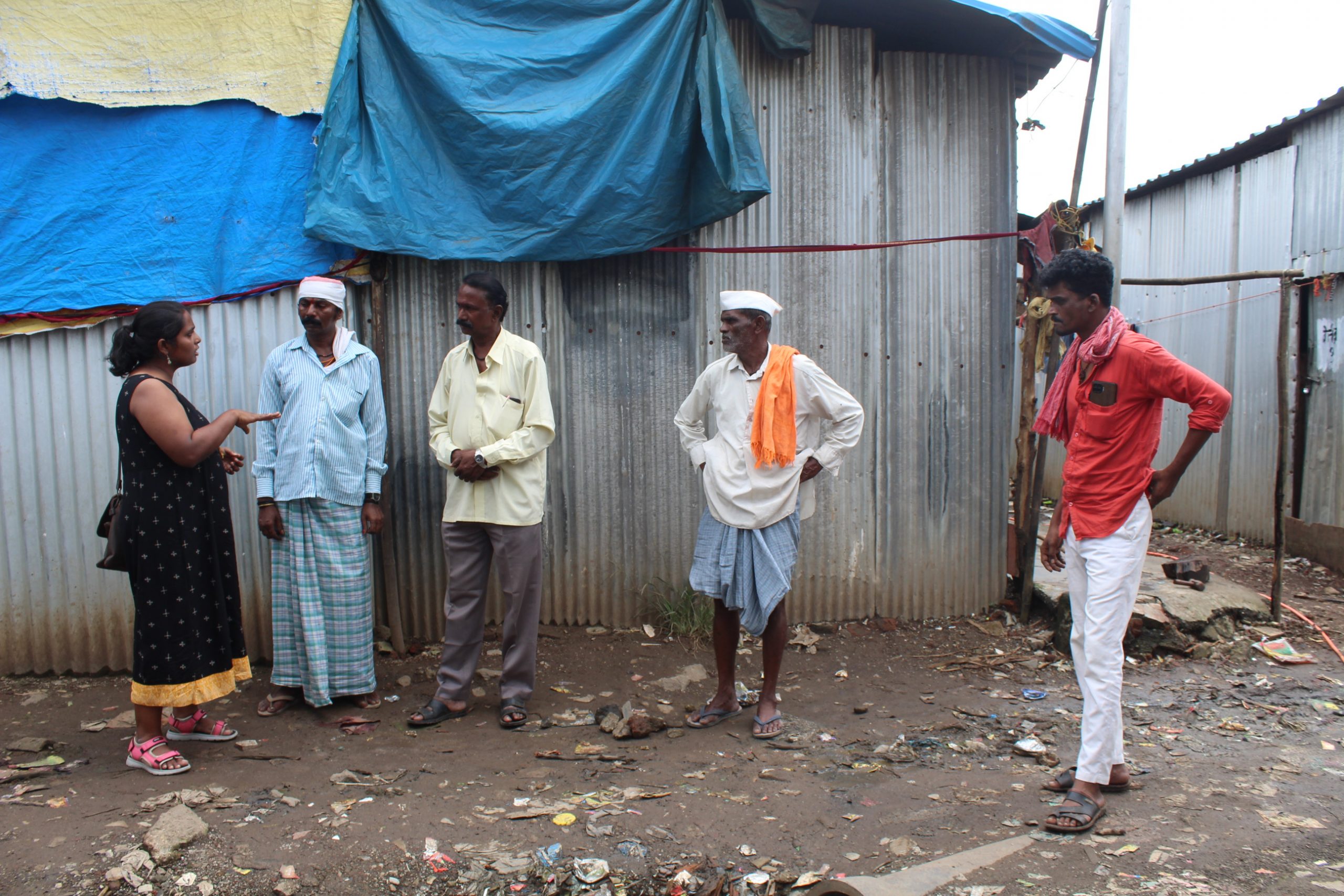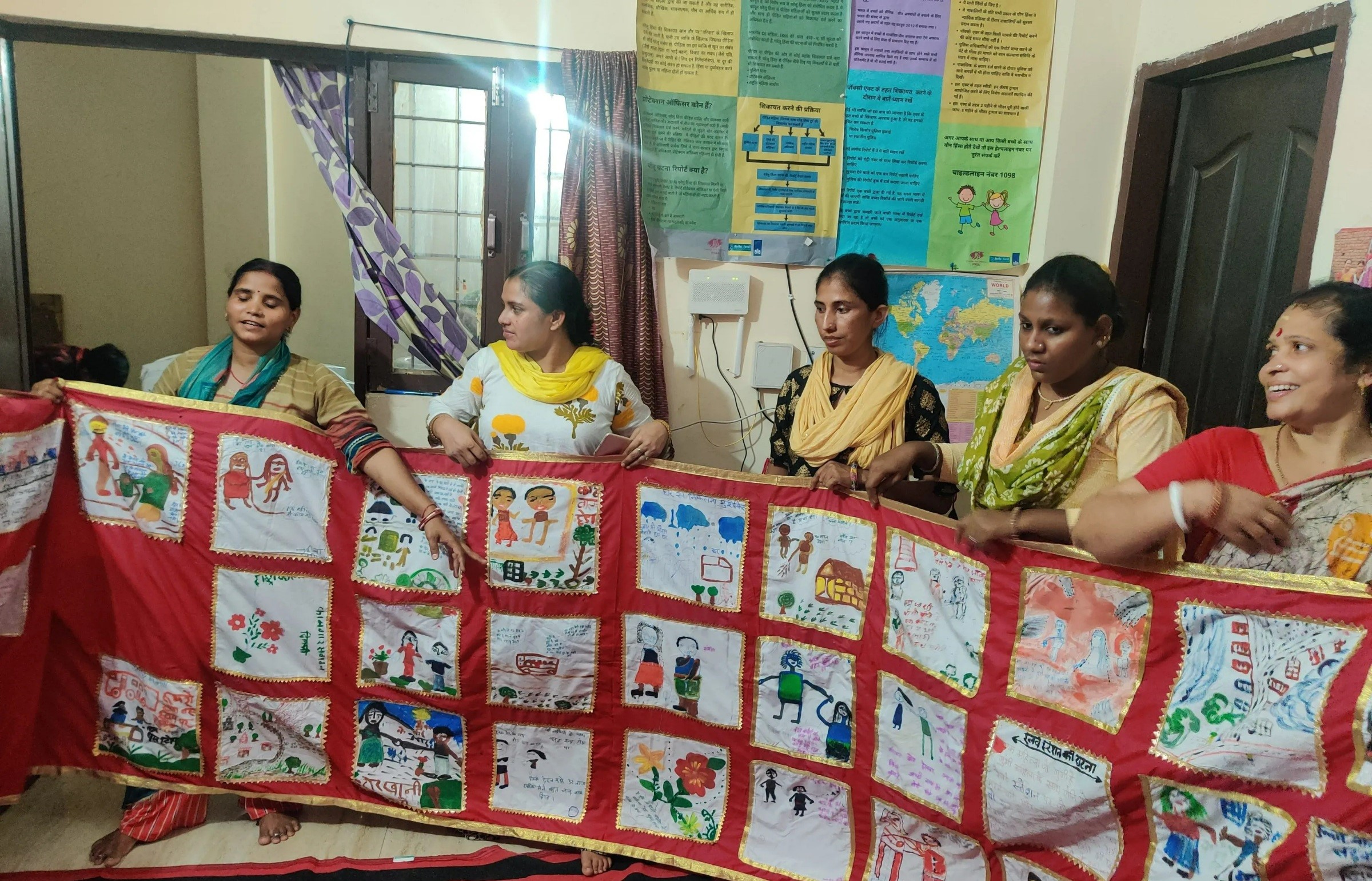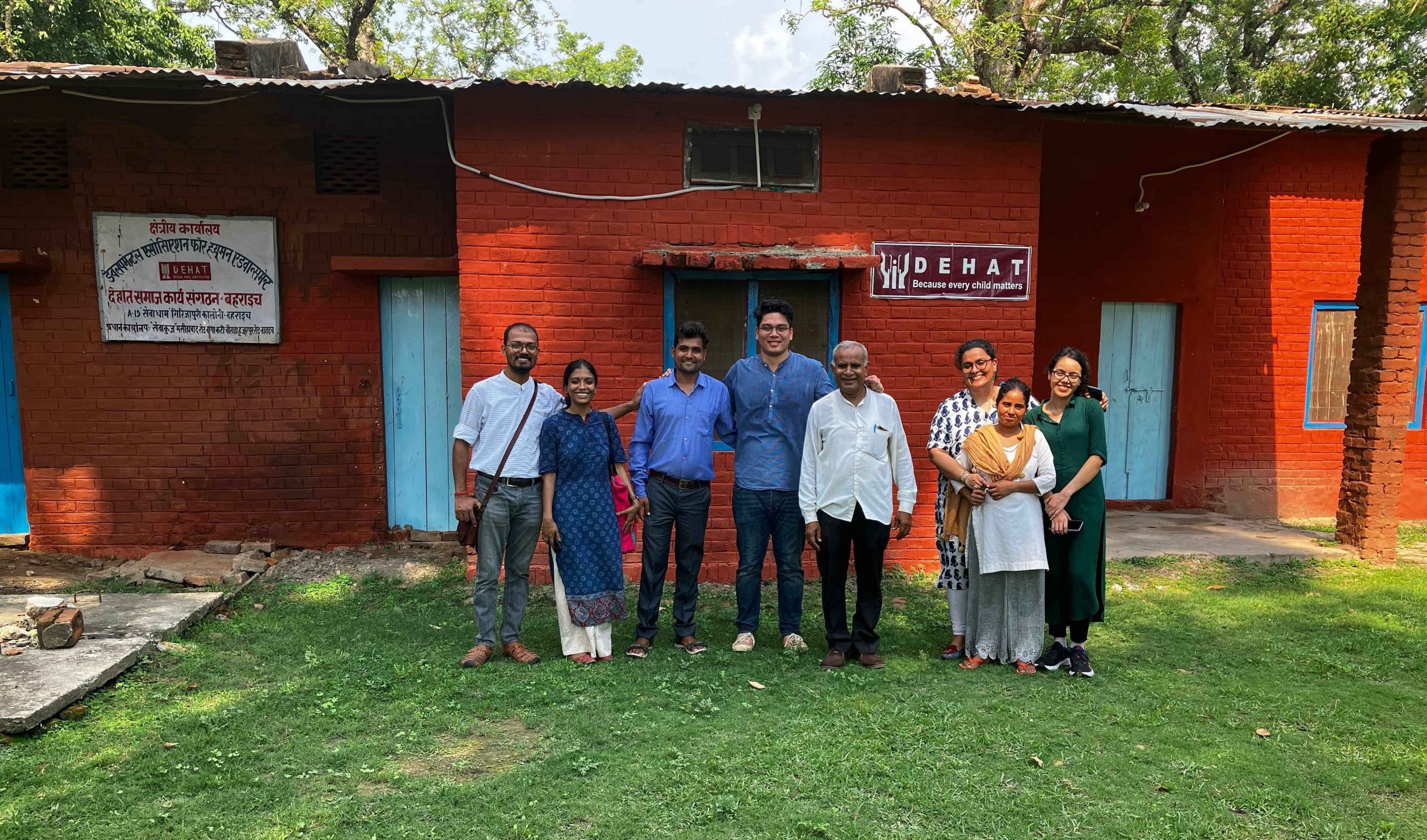Location: The centre is located in the Bouddha Wada in Kolegaon, a largely Agri-community dominated peri-urban area, without facilities like a city but more developed than a village.
We meet Amrita at Katai Naka. Amrita, a founding team member of the organization, heads fundraising and several other functions at Anubhuti, and she takes us to the Kolegaon youth centre where 15-20 boys and girls are having an animated discussion. They are planning for a rally on the 15th of August, for which there are songs and slogans being prepared. The energy is infectious, and the language isn’t a barrier.
We sit down in the nearby room and are being given tea and breakfast when Deepa arrives as well. This is the first time either of us is meeting her in person, after many online conversations. This doesn’t feel like the first time.
We spend about an hour talking to her, Amrita, and two centre facilitators— Darshana and Reshma. They talk about the challenges of nomadic and tribal communities of the region and the criticality of providing spaces for the youth, physical and otherwise. They offer some sharp commentary on the importance of context in every single activity they do, and about being careful not to criminalize the already marginalized by taking blanket actions even when speaking about women’s issues and domestic violence. She acknowledges the intrusion of heteronormative and patriarchal structures within Adivasi and Bahujan communities but reiterates the importance of providing recourse that is contextual.
Thus, often Anubhuti Trust has had to develop new modules, ways of teaching, and counselling, for the communities they work with. This is when Deepa lays out her vision for the work they do, while the youth group in the background bursts into a song dedicated to Savitribai Phule.
Deepa asks: How do we enable youth with lived experiences from marginalized communities to build leadership, and find spaces in the constitutional framework to participate and claim their rights?
Anubhuti Trust focuses on mental justice, sexual and reproductive health and agency, cultural mobilization, career leadership, and access to higher education, as a means to support youth in breaking free from inter-generational cycles of discrimination, marginalization, and vulnerabilities. Deepa then begins facilitating a session with the youth group on gender norms and claiming spaces in public events such as Independence Day and the upcoming Vimukta Jati Day on 31st August. She speaks to the youth about respecting boundaries and ensuring that they create safe spaces when both genders are interacting with one another. The way she conducts the conversation is friendly and insightful, she touches upon topics relevant to adolescence with sensitivity.
“Law and policy only apply to stable communities.”
“Leadership for marginalized youth is a process where they occupy space, gain freedoms, and claim their rights.”
Location: We are in a prime area close to Badlapur station, where 500+ families from various marginalized communities are relocated to a marshy land, with no sanitation or basic amenities
- Deepa introduces us to Ingoli Dada. He is a member of a nomadic tribe community with about 530 families in the area and speaks about spending the past 25 years fighting to get the community land rights. Anubhuti was introduced to him via their relief work during the pandemic and have been supporting him since. The families are from a number of different Nomadic and Denotified tribes— Nathpanthi Davari Gosavi, Banjara, Paradhi, Madari among others. The area is unique in having a mixed crowd.
- We have another tea, while Ingoli Dada tells us about how they were forced to vacate the better pieces of land they were living on after the lockdown was announced and to move into a much smaller and marshy area. Here, the government supported about half of them put up asbestos (patri) houses, while the rest had to fend for themselves. They have had to fight for access to some electricity, still have no access to sanitation and waste management services.
- Despite occupying this land, they are under constant stress of eviction and are harassed by local authorities. Part of the land is given away for the construction of a cinema hall – a case of the development versus displacement. Most of the communities here are still into their traditional livelihoods and have not been able to find a means to more dignified work or sustainable livelihood options.
- Over the past few decades, Dada himself has been helping the community get ration cards and Aadhaar Cards. The ration cards they have don’t provide them with any food or essential supplies. These efforts are Dada’s way for establishing some legitimacy to the community. The land does not still belong to them.
- There is a deeply emotional moment as Ingoli Dada and Deepa discuss the precarity of their living situation, while breaking down briefly. Then, a few quiet moments later, Deepa reflects that communities who are wrongly implicated by the socio-legal system still remain committed to constitutional frameworks while fighting their battles. This hits hard.
“The lack of rights and access to land or basic facilities for leading a dignified life affects sexual and reproductive health, mental health, addiction, child marriage, and so many other phenomena. On this marshy land, during monsoons, people don’t have proper land to live on, the youth drop out of school and are negatively affected.”
Location: Number 6 in the Rahatoli Swabhiman Chawl is a place that Deepa used to rent for living earlier – this has now turned into a youth centre over the years
- Our last stop is at Anubhuti’s centre in Rahatoli village. Here, young children are practising their singing and dancing while playing the lezim. We hear more of Deepa’s philosophy as she tells the children that they should know the meaning of each word of the songs they are singing since people will hear them at public events and take notice. The children are very enthusiastically being guided by Saif and Yogita, who later hitch a ride back to the station with us. She also reminds her field facilitators that the children should be reminded that the songs are written by a Mumbra-based organization called Aawaaz-e-Niswan.
- We end up eating a delicious late lunch made on order by one of the community members, while Deepa and Amrita talk about how they work with a CA to remain up to date on compliances. They tell us how the Guidestar certification process last year (initiated during BTF) threw up a few details they were not aware of. They then prepare to get on a Zoom call and there is a bustle to ensure that the Jio dongle is working, while we say our goodbyes.
- Guided by Saif and Yogita, we are shown the various locations where they undertake community outreach, en route Badlapur station. They show us a forest area where the youth are brought for nature walks guided by experts who tell them about the flora and fauna. Saif remarks how the landscape of the area has changed over the last decade, with greenery replacing concrete.
“It is important to approach our work with a balanced perspective and rights-based approach.”
“Cultural immersion and change are very important to mobilize youth. This will inspire them to take action and feel confident.”



